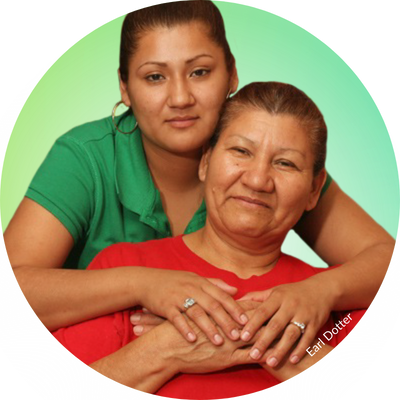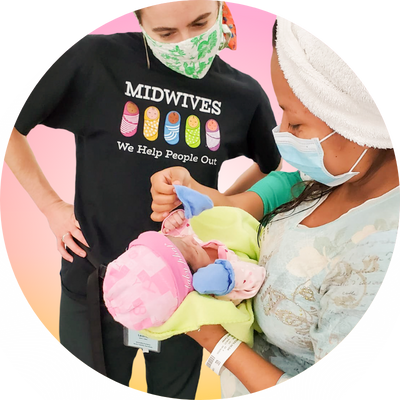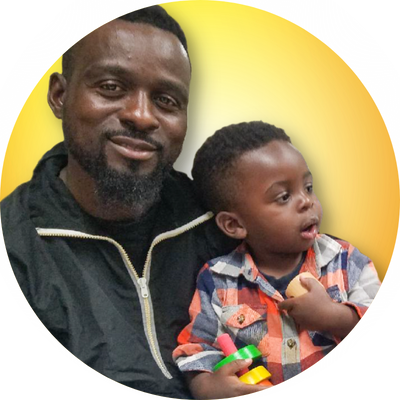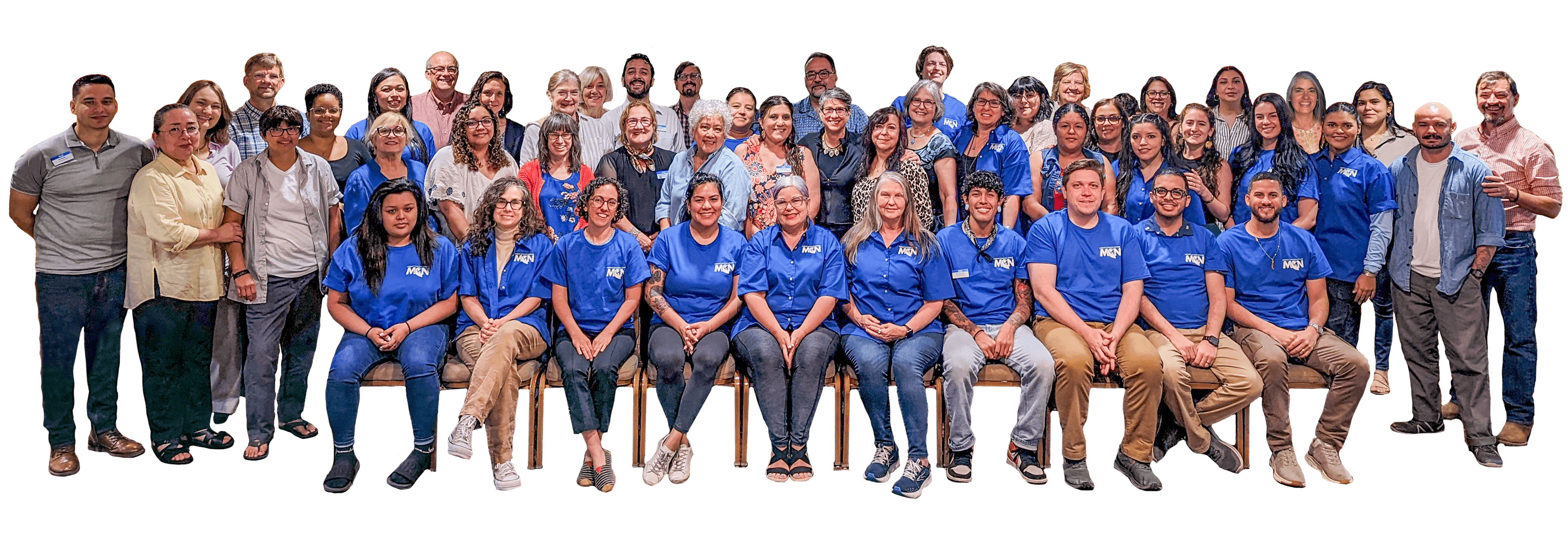Our Story
Our Organization
Migrant Clinicians Network is a national 501(c)3 nonprofit organization that provides support, technical assistance, and professional development to clinicians in community health centers, health departments, and other health care delivery sites. Through online seminars and learning collaboratives, on-the-ground trainings, resource development, and advocacy, MCN enables clinicians to provide quality health care, increase health care access, and reduce disparities for people who need ongoing care but are experiencing outside forces that exacerbate their vulnerability.
We also provide virtual case management directly to patients who may otherwise be lost to follow-up because of their need to move, through our innovative program Health Network. We directly serve anyone with any ongoing health need who, because of their vulnerabilities, may be unable to continue their needed treatment plan as a result of the choice to migrate or forced displacement. We serve farmworkers and dairy workers, temporary day laborers, short-term migrants returning for a visit to their country of origin, and refugees forced from their homes, fleeing disease, violence, climate catastrophe, or economic instability.
MCN is a global organization with more than 10,000 constituents. Our work is overseen by a Board of Directors comprised of frontline clinicians, researchers, policymakers, and academics with experience in and commitment to health equity. MCN employs a professional staff of about 40, based in four offices across the mainland US and in Puerto Rico. MCN engages in research, develops and distributes much-needed resources, advocates for patients and clinicians, engages outside partners, and runs programs that support clinical care on the frontline of migrant health.
MCN actively faces and combats inequities in its work, making diversity, equity, inclusion, and accessibility (DEIA) central to its strategic plan. MCN equips clinicians, community health workers, and workers with comprehensive training and technical assistance that is culturally competent and culturally humble. MCN advances equity through language justice by offering educational webinars and written materials in both English and Spanish. Fostering an inclusive work environment starts by creating a safe space for all workers to ask questions, take risks, and be vulnerable with each other, this happens at MCN. Additionally, all staff are encouraged to participate in DEIA work groups. Professional development and promotional pathways to support the advancement of our diverse staff are identified. Each year, measurable goals in all areas of DEIA are set, and success and areas of growth are tracked. MCN is looking ahead and embracing a culture of DEIA that is deliberate and welcoming for their employees and all whom they serve.
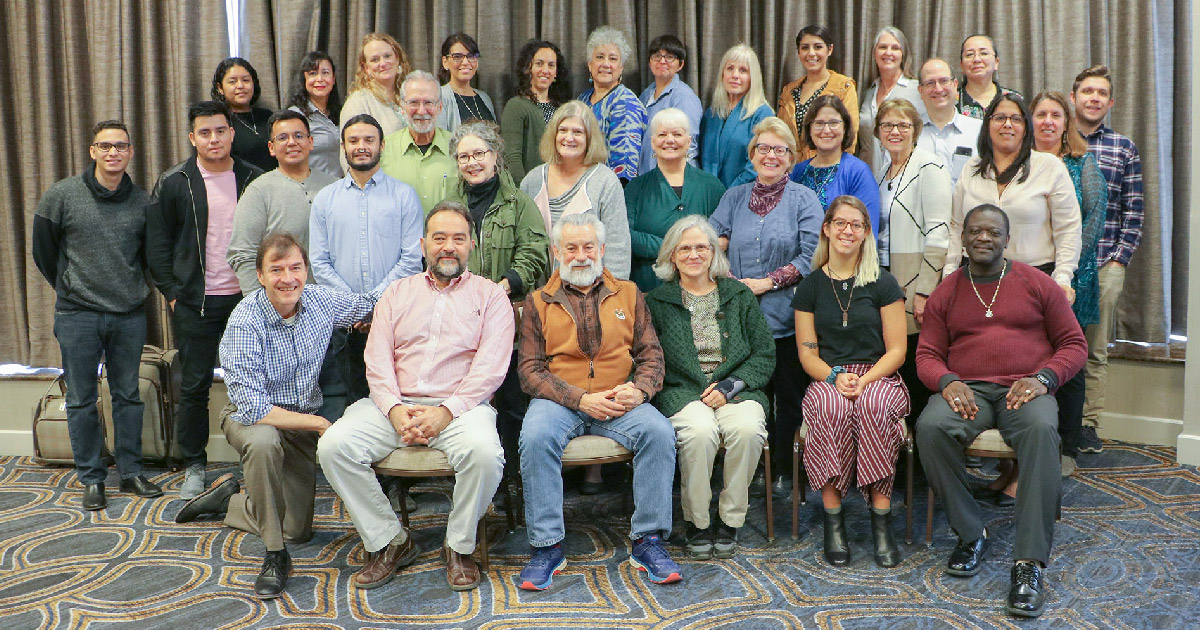
MCN Staff and Board of Directors (2019)

Our History
In 1984, three dedicated clinicians met at the Migrant Health Conference in Padre Island. The three clinicians -- Willa Hays, RN from Northwest Michigan Health Services, Inc.; Gail Stevens, RN from Delmarva Rural Ministries; and David Smith, then a physician at Brownsville Community Health Center -- shared a sense of personal isolation and dismay at the lack of migrant-specific resources available to clinicians.
In 1985, they formed Migrant Clinicians Network, a grassroots clinical network consisting of clinicians dedicated to improved health care for people who, because they are moving, are at risk to be lost to follow-up. In 2019, Migrant Clinicians Network celebrated its 35th year in the fight for health justice for the mobile poor.

Our Clinical Constituents
MCN serves a breadth of health professionals who provide care for migrants. Roughly two-thirds of MCN’s constituency are clinicians providing direct health care to migrants. The remaining third includes individuals whose efforts, all or in part, focus on migrant health. Slightly over 50 percent of MCN’s clinical constituents are based at community health centers. The remainder are based in other sites including hospital emergency departments, private practice, health departments, research institutions, and educational institutions. Our focus on the multidisciplinary team includes resources and assistance specifically for community health workers or promotores de salud. MCN constituents are located throughout the US and include international health professionals with an interest in migrant health.

Our Work
MCN currently has several areas of programmatic focus, while remaining nimble and responsive to issues that arise in clinics throughout the country. At present, MCN has specific initiatives in the areas of mental health of frontline providers; climate change, emergency preparedness, and disaster response; occupational/environmental health; family violence prevention; and continuity of care/bridge case management for mobile patients including migrant farmworkers and asylum seekers leaving detention. Other areas of expertise include immunization, infectious diseases, global health, chronic illness, and health promotion. MCN is active throughout the US and Puerto Rico, and our Health Network case management team has provided continuity of care services to patients moving from the US to 114 countries.
Much of MCN’s work is driven by the needs of clinicians requesting assistance. In order to respond effectively to any issue that arises, MCN draws on internal staff resources, a cadre of migrant health experts, and a library of technical assistance materials to handle the requests as they arrive. See our Technical Assistance page for more information.
MCN also advocates on behalf of both migrant clinicians and the mobile populations that they serve.
Learn more on our Health Justice page.
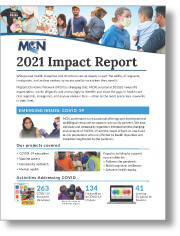 MCN's Impact Report: 2021 | 2020 | 2019 | 2018 | 2017 | 2016 | 2015 | 2014 | 2013 | 2012 | 2011
MCN's Impact Report: 2021 | 2020 | 2019 | 2018 | 2017 | 2016 | 2015 | 2014 | 2013 | 2012 | 2011
Our mission is to create practical solutions at the intersection of vulnerability, migration, and health.
People across the US, when moving for new opportunities, to work in farms across the nation, or because they have been displaced, often struggle to access our health care system because of language barriers, poverty, rural locations, unfamiliarity with their new community, and more.
Clinicians who serve our communities lack the strategies, resources, and technical assistance to effectively remove barriers to ensure high-quality, evidence-based, and cost-efficient care is accessible to ensure a healthy workforce and support healthy communities.
Migrant Clinicians Network is transforming the health system to connect people with care when they need it, and to bolster the clinicians who serve them. MCN develops practical solutions to the biggest challenges in health, supporting both clinicians and our communities directly, through six primary avenues:
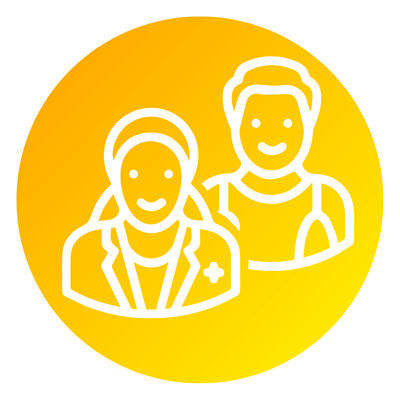 |
MCN has a long history of providing training and technical assistance to all members of the health team who engage with patients to make sure that our clinicians can contribute to a cost-effective and community-forward health care system. MCN supports all aspects of the professional life of a migrant clinician, including:
|
|
|
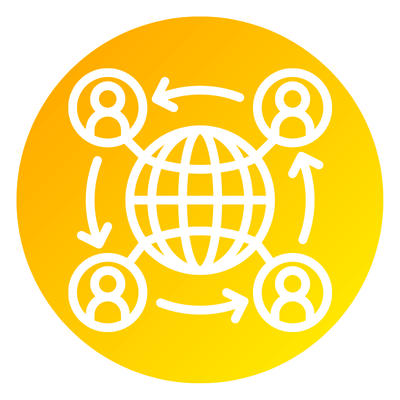 |
The US health care system is built for patients who are geographically stable and live close to care. For everyone else, there’s Health Network. MCN’s award-winning continuity of care program is for patients with ongoing health needs who have to move before their treatment is completed. Health Network is proven to be cost effective and to save lives. This important program ensures a stronger, more effective health care system that can respond to patients who would otherwise be lost to follow-up, delaying care and requiring more expensive and less effective care after their diseases have progressed. Since 1995, HN has served thousands of farmworkers, displaced people, and others moving within the US, or from the US to 120 other countries. |
|
|
 |
MCN is well known for its award-winning train-the-trainer curricula, ever-popular downloadable low-literacy comic books, and up-to-date, customizable materials addressing emerging issues from a clinician’s perspective.
|
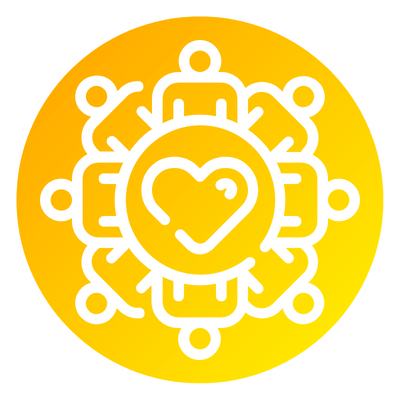 |
MCN engages in numerous efforts to support hyper-local efforts to engage members of the community who are so often overlooked and marginalized, particularly when it comes to health. In Texas, MCN has partnered with the Ventanilla de Salud to expand access to culturally relevant health information, services, and screenings. In Maryland, MCN was active in supporting the Vulnerable Populations Task Force throughout the COVID pandemic, and then amplified the promising practices coming out of the task force through webinars and blog posts. In California, PhotoVoice is giving women and teens the opportunity to tell their stories through cameras. These are just some of the community engagement initiatives in which we are taking a lead. |
|
|
 |
MCN is proud of its Institutional Review Board – a rarity outside of academic spaces. Research teams can underestimate the importance of culturally competent approaches for migrant and immigrant research subjects. Since 1999, MCN’s IRB has ensured, in advance and by periodic review, that appropriate safeguards are in place to protect the rights, safety and welfare of human research subjects, particularly migrant farmworkers and other mobile, marginalized, and vulnerable populations. In 2021, MCN built an in-house evaluation team to better quantify and support programmatic efforts to train clinicians on issues of migrant health. MCN’s IRB and evaluation efforts are available to support external projects or research activities. |
|
|
 |
Health justice is at the center of everything that MCN does. MCN has actively advocated in several arenas to continue to support and strengthen our health care systems, support frontline clinicians, and improve and maintain the health of people who have to move, like farmworkers who move for work, or displaced people who move after a disaster. We have worked on improved occupational health and safety standards including updates to the Worker Protection Standard and national heat stress legislation, and clinical advocacy at international bodies including the United Nations on topics like tuberculosis. |
|
|
Our Organization
Migrant Clinicians Network is a 501(c)3 nonprofit organization. MCN has been awarded the Platinum Seal of Transparency, the highest level of recognition, from GuideStar/Candid, is a Top-Rated NonProfit according to GreatNonProfits, and has a score of 100 out of 100 from Charity Navigator.
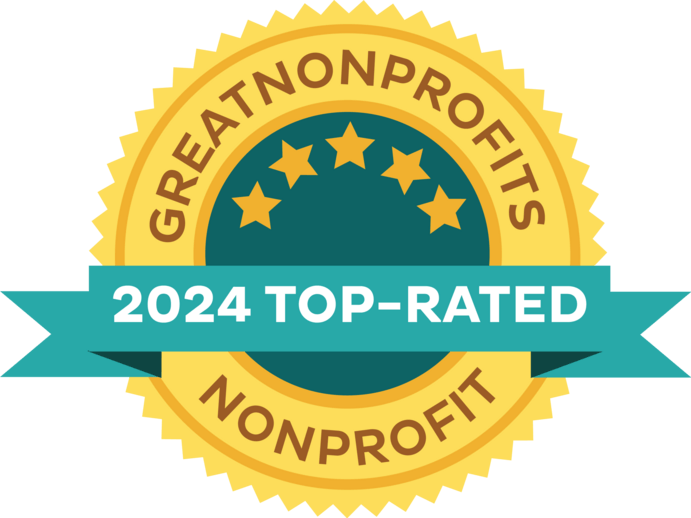 |
 |
 |
MCN is a global organization with more than 10,000 constituents. Our work is overseen by a Board of Directors comprised of frontline clinicians, researchers, policymakers, and academics with experience in and commitment to supporting thse at highest risk of health concerns. MCN employs a professional staff of about 50, based in offices or working remotely. Almost three-quarters of our staff is bilingual or multilingual and many come from immigrant and migrant families.
MCN equips clinicians, community health workers, and workers with comprehensive training and technical assistance that is culturally competent. MCN advances language justice by offering educational webinars and written materials in both English and Spanish. Fostering an inclusive work environment starts by creating a safe space for all workers to ask questions, take risks, and be vulnerable with each other, this happens at MCN.
MCN Staff and Board at the 2024 Strategic Planning Meeting.
Our Clinical ConstituentsMCN serves a breadth of health professionals who provide care for migrants, immigrants, and asylum seekers, and other marginalized and underserved people. Roughly two-thirds of MCN’s constituency are clinicians providing direct health care to migrants. The remaining third includes individuals whose efforts, all or in part, focus on migrant health. Slightly over 50 percent of MCN’s clinical constituents are based at community health centers. The remainder are based in other sites including hospital emergency departments, private practice, health departments, research institutions, and educational institutions. Our focus on the multidisciplinary team includes resources and assistance specifically for community health workers or promotores de salud. MCN constituents are located throughout the US and include international health professionals with an interest in migrant health. |
Our History
In 1984, three dedicated clinicians met at the Migrant Health Conference in Padre Island. The three clinicians -- Willa Hays, RN from Northwest Michigan Health Services, Inc.; Gail Stevens, RN from Delmarva Rural Ministries; and David Smith, then a physician at Brownsville Community Health Center -- shared a sense of personal isolation and dismay at the lack of migrant-specific resources available to clinicians. In 1985, they formed Migrant Clinicians Network, a grassroots clinical network consisting of clinicians dedicated to improved health care for people who, because they are moving, are at risk to be lost to follow-up.
Our Language
At Migrant Clinicians Network, we understand that language is constantly evolving as society and cultural values change. We strive to use language that celebrates the communities we serve, remains respectful, and mitigates the harmful impacts of bias. We routinely review our content and welcome feedback on our language use, updating it as needed.
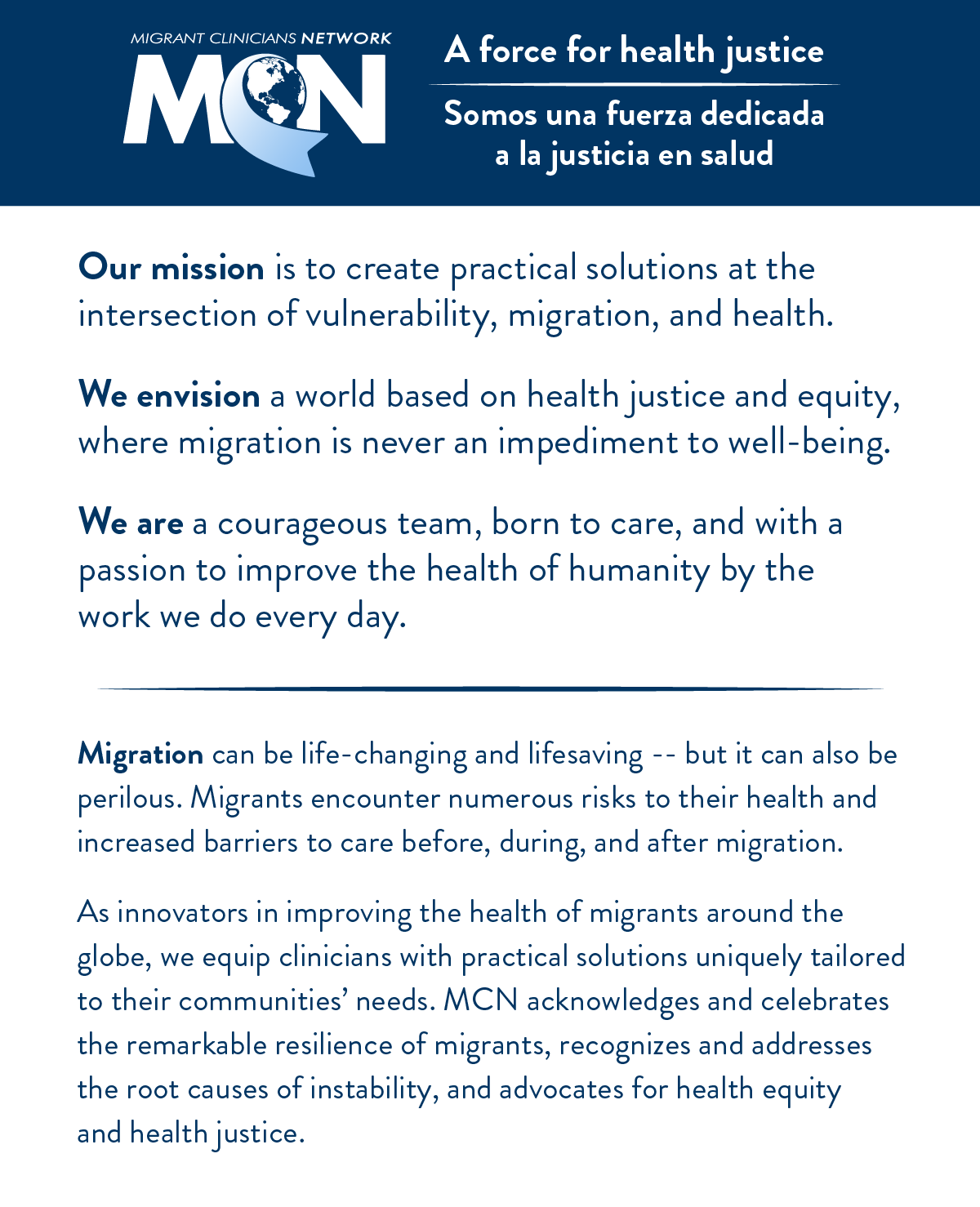
.png)
